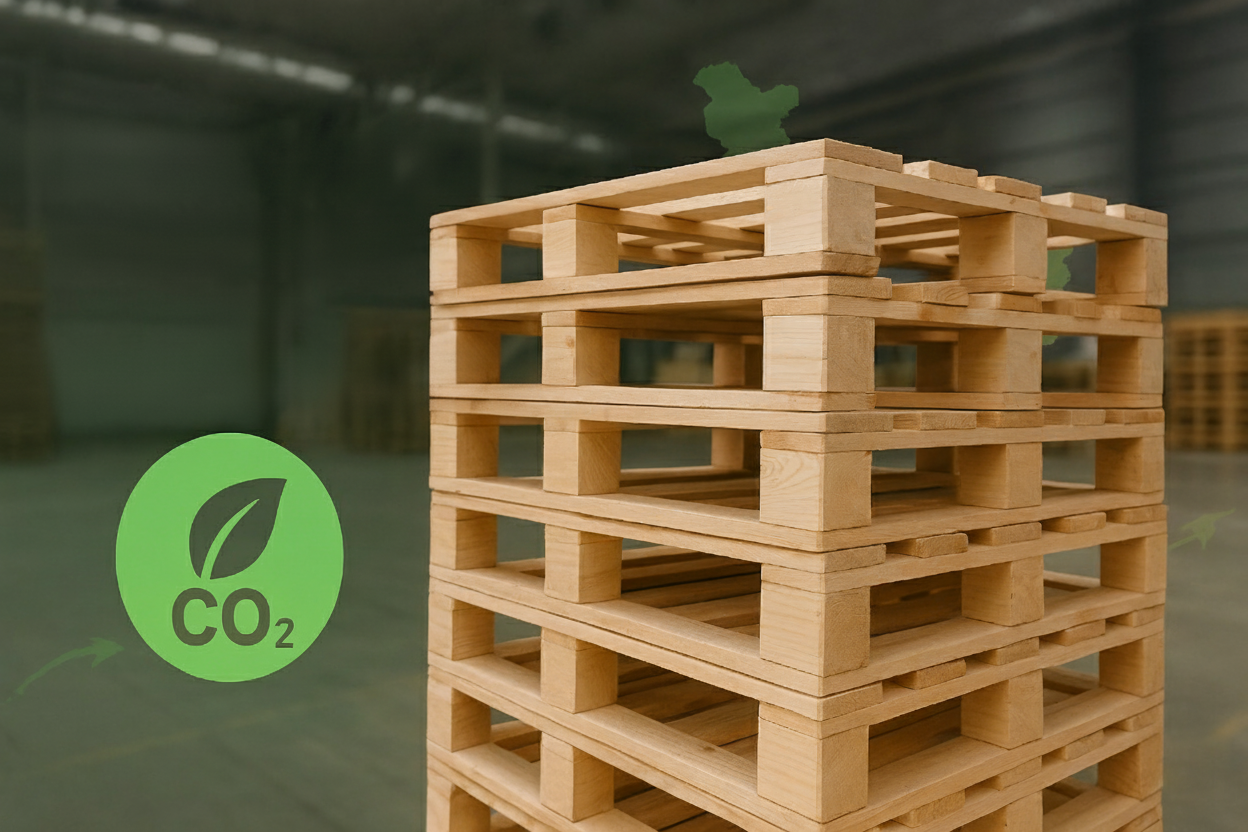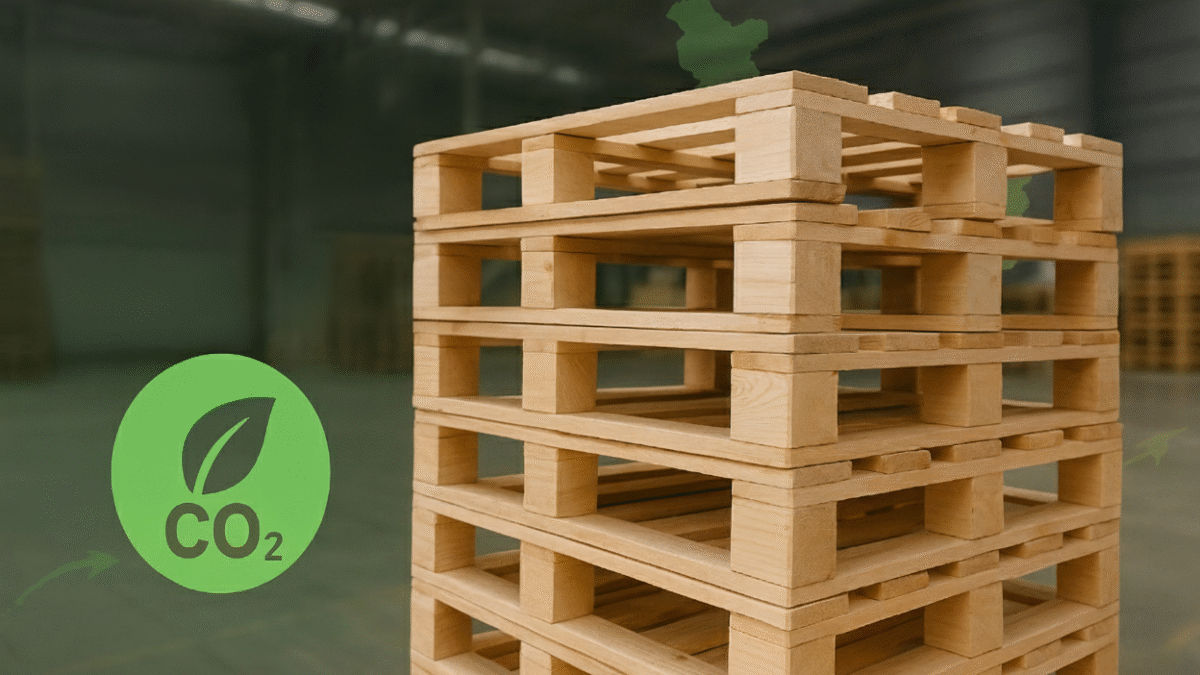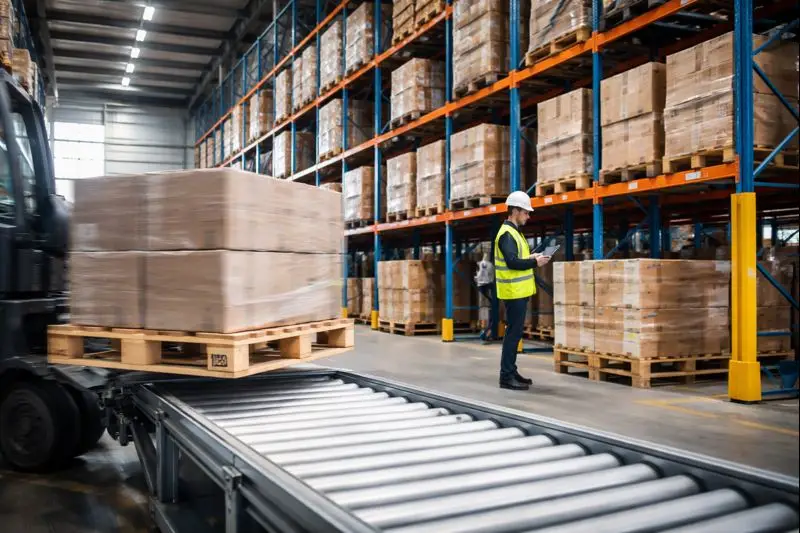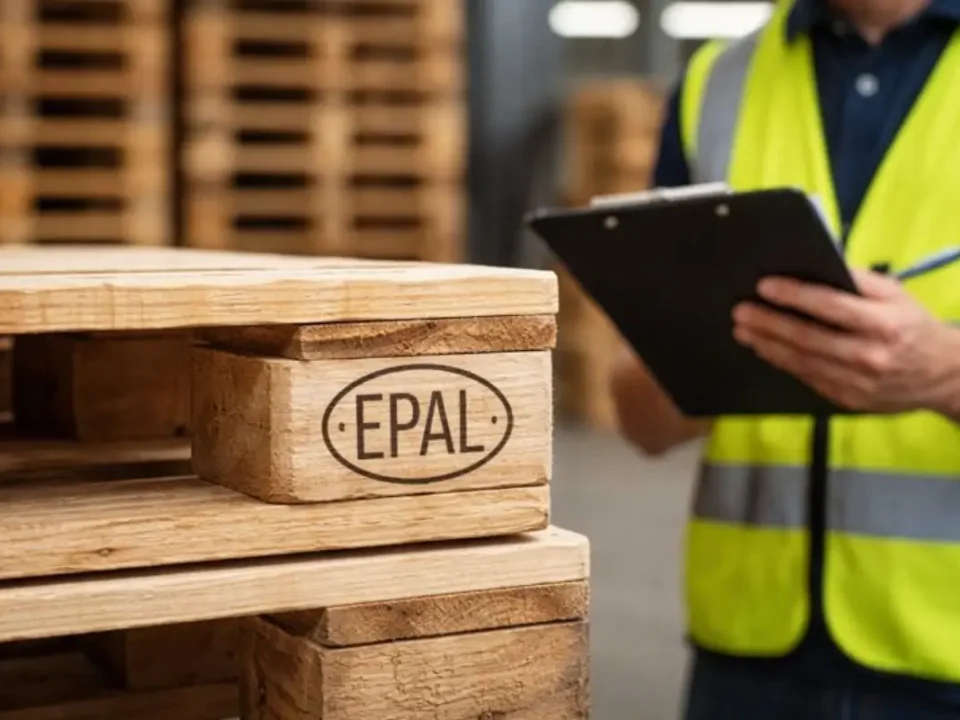
Pallets for Food and Beverage Logistics: Choosing the Right Type
October 16, 2025
Recycling Wooden Pallets: Step-by-Step Process
November 13, 2025How Wooden Pallets Reduce Supply Chain Carbon Footprint in India
In India’s rapidly growing logistics and manufacturing sector, reducing the wooden pallets carbon footprint is no longer optional; it’s a business imperative. With e-commerce, exports, and industrial growth on the rise, manufacturers, exporters, and logistics managers are under increasing pressure to adopt greener practices. One effective but often overlooked solution is the use of wooden pallets.

According to The Economic Times, the Indian wooden pallet market was valued at approximately US$946.8 million in 2022 and is projected to reach US$1,604.5 million by 2030. This growth not only signals increased demand for efficient logistics but also provides an opportunity to embed sustainability into supply chains.
Why Carbon Footprint Matters in Indian Supply Chains
Carbon emissions in the logistics sector come from multiple sources: transportation, packaging, and storage. Globally, logistics accounts for nearly 14% of total greenhouse gas emissions, and in India, the rapid growth of road and rail freight has amplified this impact. Each component of the supply chain contributes to carbon footprint, and packaging materials play a surprisingly significant role.
Wooden pallets, when compared to plastic or metal alternatives, offer a measurable reduction in CO₂ emissions due to their renewable sourcing, lighter manufacturing process, and potential for reuse and recycling.
Wooden Pallets: A Greener Choice
1. Renewable and Certified Sourcing
Indian pallet manufacturers, such as Jay Wood Industry and Radha Agro Industries, increasingly source wood from certified sustainable forests and use renewable energy in manufacturing.
Heat-treatment plants ensure compliance with international export standards (ISPM-15) while maintaining low energy consumption. Using wood from responsibly managed forests locks carbon in the material and reduces dependence on petroleum-based plastics.
2. Lower Manufacturing Carbon Footprint
Global studies indicate that a single wooden pallet’s cradle-to-gate carbon footprint is roughly 5 kg CO₂‑eq., compared to 30–40 kg for a plastic counterpart.
While India-specific LCA studies are limited, Indian manufacturers’ use of solar-assisted plants, efficient kilns, and locally sourced timber further reduce embodied carbon.
3. Carbon Storage and Sequestration
Wood is biogenic, meaning it naturally stores carbon absorbed during tree growth. Even at the end of its lifecycle, if reused, recycled, or converted to biomass, a wooden pallet continues to contribute positively to carbon balance.
In contrast, plastic pallets release fossil fuel-based emissions and often require energy-intensive recycling processes.
Reuse and Repair: Maximizing Sustainability
One of the most significant levers for carbon reduction in India is pallet reuse. Wooden pallets are highly repairable and can be reused 10–15 times or more.
According to local pallet suppliers, a single reused pallet can save up to 15 kg CO₂ emissions compared to manufacturing a new one. For exporters and manufacturers shipping products across India or internationally, this translates into substantial cumulative savings.
Encouraging internal reuse and participating in pallet pooling schemes can extend service life and reduce overall supply chain emissions.
End-of-Life Management
In India, discarded wooden pallets are often shredded for biomass, repurposed for furniture, or returned to manufacturing for recycling. This circular approach minimizes landfill contribution and avoids emissions associated with plastic pallet disposal.
By adopting end-of-life recovery strategies, Indian companies can further reduce supply chain carbon footprint while complying with environmental regulations and ESG requirements.
This circular recovery approach connects directly with how the recycling wooden pallets process keeps usable material in circulation instead of sending it to waste streams.
Comparing Wooden and Plastic Pallets in the Indian Context
While plastic pallets are durable and resistant to moisture, their carbon footprint is substantially higher:
| Type | Cradle-to-Gate CO₂ (kg) | Reuse Potential | End-of-Life Impact |
|---|---|---|---|
| Wooden Pallet | ~5 kg | 10–15+ times | Recyclable, biomass, or upcycled |
| Plastic Pallet | 30–40 kg | 5–10 times | Energy-intensive recycling; higher emissions |
Given India’s supply chain realities, long transport routes, exposure to humidity, and local recycling infrastructure, wooden pallets emerge as the more sustainable option for manufacturers, exporters, and logistics managers.
Best Practices for Indian Manufacturers and Exporters
- Source FSC/PEFC Certified Wood – Ensures sustainable forestry and reduces embodied carbon.
- Invest in Reuse & Repair – Track pallet life cycles and encourage repair instead of disposal.
- Local Manufacturing & Short Supply Lines – Reduces transport emissions and supports local industry.
- Heat Treatment for Export Compliance – Minimizes chemical treatments that add carbon burden.
- End-of-Life Planning – Partner with recycling or biomass recovery facilities to maximize circularity.
Implementing these strategies not only reduces emissions but also strengthens supply chain resilience and enhances brand reputation in global markets increasingly focused on ESG compliance.
Conclusion: Wooden Pallets as a Carbon Reduction Tool
Wooden pallets in India offer a tangible, cost-effective pathway to reduce supply chain carbon footprint. Their renewable sourcing, ability to store carbon, high reuse potential, and circular end-of-life options make them an indispensable tool for manufacturers, exporters, and logistics managers aiming to meet sustainability goals.
By integrating wooden pallets into your supply chain strategy, companies can simultaneously achieve operational efficiency, export compliance, and measurable environmental impact reduction.
Skylar Impex helps Indian businesses adopt sustainable wooden pallet solutions that reduce carbon footprint while optimizing logistics. Contact us today to audit your supply chain and discover how wooden pallets can transform your operations into a greener, more efficient, and export-ready system.




